Dagstuhl-Seminar 24342
Leveraging AI for Management Decision-Making
( 18. Aug – 21. Aug, 2024 )
Permalink
Organisatoren
- Stefan Feuerriegel (Ludwig-Maximilians-Universität München, DE)
- Foster Provost (New York University, US)
- Galit Shmueli (National Tsing Hua University - Hsinchu, TW)
Kontakt
- Andreas Dolzmann (für wissenschaftliche Fragen)
- Susanne Bach-Bernhard (für administrative Fragen)
Funding by the German Research Foundation (Grant: 530066172) and the Swiss National Science Foundation (SNSF) via Grant 186932 is acknowledged.
Introduction
Artificial intelligence (AI) has been named a core element of the “fourth industrial revolution” [40]. According to recent estimates by McKinsey & Company, AI has the potential to deliver the added global economic value of $13–20 trillion annually [5].
AI is increasingly being embraced for decision-making in management, both across a wide array of industries (e.g., healthcare, banking, education, manufacturing, retail) and functions (e.g., marketing, accounting, operations, IT). For example, AI can be used for modeling customer behavior [2, 6, 25, 26, 4]. These predictions can also serve as input for better decision-making. Examples include assortment optimization [24, 19], investment decisions [32], scheduling [42], allocation decisions [29, 31, 46], and pricing [1]. AI can predict business failures and thus act as an early warning system for improving service quality [34]. AI can help to locate drivers of low quality and eventually improve product quality [44, 45].
Recent advancements in AI research hold great promise for decision-making in businesses and organizations. Driven by the surge in data availability, computing power, and algorithmic advancement, contemporary AI algorithms are capable of emulating human decision-making and judgment [39]. This places AI in a position to augment and automate a wide range of management decisions within companies and organizations. At the same time, the use of AI for decision making, especially in high-risk applications, poses ethical and legal challenges such as the use of algorithmic risk assessment tools in criminal justice [18]. Likewise, new implications arise from emerging AI acts (e.g., the EU AI Act) with crucial implications for how AI applications must be designed.
A key enabler for data-driven decision-making in business and organizations are new AI technologies [17]. For example, deep learning can empower better decisions in business analytics and operational decision-making [30, 28]. Causal machine learning (ML) allows for optimal targeting (e.g., of customer coupons) by estimating and subsequently leveraging individualized treatment effects [37, 20, 11, 14, 15]. Probabilistic machine learning fuses methods from a statistical foundation with flexible building blocks from neural networks to yield models that are both flexible and explainable for practitioners in risk management [38, 35, 36]. Further, explainable AI (XAI) has emerged as a principled, user-centered tool not only for explaining black-box prediction models but also for explaining the decisions that are made or recommended by AI systems [33, 45, 16, 27, 3], which can be used to identify root causes of bad quality and thereby inform better decision-making in quality management [44]. Likewise, generative AI [12] and AI fairness [9, 7, 10] offer new research opportunities. Importantly, the aforementioned examples can only be solved effectively through new AI technologies that have been developed in recent years. At the same time, the use of advanced AI on digital platforms, especially the marriage of reinforcement learning with behavior modification techniques, has spurred controversy, creating adverse effects to humans and societies, such as addiction, social discord, and political polarization [22]. Existing and envisioned combinations of prediction and causal behavior modification have implications to platforms and their business customers [23]. These technologies have also created new types of barriers for academic researchers [41, 21].
Aims of the seminar
The aim of our Dagstuhl Seminar “Leveraging AI for Management Decision-Making” (24342) was to discuss the future of research on AI/ML in businesses and organizations, and how the field should evolve. We especially sought to focus on “rethinking” the field by discussing the current state of AI/ML in businesses and organizations, discussing thought-provoking questions (e.g., is explainable AI really needed in practice? Where can generative AI actually lead to productivity gains? Does the algorithmic approach to fairness hold much for the future of AI ethics?), and maybe identifying and elevating new important research questions.
Our intended outcome was to reach a joint position (as a group) on what are important and unimportant research directions and what those directions should be going forward. What are the challenges? What are the opportunities? What research questions deserve attention? What questions are getting more attention than they really deserve? Below, we summarize our thoughts where we discuss existing research gaps and make suggestions for the field going forward.
Prior to the seminar, a survey was shared with all participants to identify key topics of interest around which we then designed our discussions. Most participants were primarily interested in topics related to method design and development, as well as the practical applications of AI. Some also expressed interest in evaluating these methods and understanding their impact on organizations. There was a strong focus on exploring the broader implications of AI, particularly in areas like ethics and governance. When asked about specific topics they would like to discuss during the seminar, participants showed the most interest in explainable AI, followed by causal ML, and generative AI. We eventually decided to prioritize the first two – explainable AI and causal ML – thus anticipating that generative AI will naturally arise in all sessions due to its prominence and thus regardless of whether it is a dedicated topic. Many indicated they were also keen to explore how AI can be applied effectively, with discussions centered around overcoming practical challenges in real-world deployments. Other popular topics include the ethics and governance of AI, its economic impact, and the implications for the future of work. However, there was less interest in topics like AI literacy and hybrid work environments. Further, participants also suggested additional topics for discussion. Some highlighted the importance of understanding the behavioral impacts of AI, such as long-term reliance on AI systems and the potential for deskilling human workers.
Organization of the seminar
We designed our Dagstuhl Seminar as an “un-conference”. By following the format of an un-conference, we eliminated the traditional sequence of research presentations from our agenda. Instead, we aimed to focus on interactivity, collaboration, and co-creation, by making space for discussions of different forms regarding how to shape the field in the future. We held discussions with the full group as well as in smaller break-out groups, where subgroups changed from day to day; we obtained information from individuals via surveys; the schedule also encouraged informal one-on-one or small group discussions while socializing. These various modes of interaction were critical, because our seminar attracted participants from a diverse crowd, from academia and industry, from method research to behavioral research, from marketing to operations. Such diverse researchers typically do not meet or interact, and hence we seized the opportunity to foster novel interactions.
We aimed to learn from each other and create more impact. For example, we actively asked each participant in the get-to-know session to provide a summary statement about their current research and where they would like to go. Throughout the seminar, there were many opportunities to potentially start new collaborations. To spur discussion, we organized short “inspiration exchanges”, which were designed as kick-offs to our breakout sessions. Hence, the idea was primarily to discuss the current state of research and point to gaps and needs to elicit forward-thinking. Here, we selected the topics prior to the seminar based on a survey that was sent to the participants. As a result, we identified two important breakout sessions: (1) AI and causality, and (2) AI and responsibility. We summarize the discussions and findings from both breakout sessions in the full report.
- Svenja Bergmann and Stefan Feuerriegel. Machine learning for predicting used car resale prices using granular vehicle equipment information. Expert Systems with Applications, 263:125640, 2024.
- Lennart Baardman, Igor Levin, Georgia Perakis, and Divya Singhvi. Leveraging comparables for new product sales forecasting. International Journal of Operations & Production Management, 27(12):2340–2343, 2018.
- Kevin Bauer, Moritz von Zahn, and Oliver Hinz. Expl(ai)ned: The impact of explainable artificial intelligence on cognitive processes. Information Systems Research, 2023. forthcoming.
- Ruomeng Cui, Santiago Gallino, Antonio Moreno, and Dennis J Zhang. The operational value of social media information. Production and Operations Management, 27(10):1749–1769, 2018.
- Michael Chui, Eric Hazan, Roger Roberts, Alex Singla, and Kate Smaje. The economic potential of generative AI. McKinsey & Company, 2023.
- Real Carbonneau, Kevin Laframboise, and Rustam Vahidov. Application of machine learning techniques for supply chain demand forecasting. European Journal of Operational Research, 184(3):1140–1154, 2008.
- Maria De-Arteaga, Stefan Feuerriegel, and Maytal Saar-Tsechansky. Algorithmic fairness in business analytics: Directions for research and practice. Production and Operations Management, 31(10):3749–3770, 2022.
- Koen W De Bock, Kristof Coussement, Arno De Caigny, Roman Słowiński, Bart Baesens, Robert N Boute, Tsan-Ming Choi, Dursun Delen, Mathias Kraus, Stefan Lessmann, et al. Explainable ai for operational research: A defining framework, methods, applications, and a research agenda. European Journal of Operational Research, 317(2):249–272, 2024.
- Mateusz Dolata, Stefan Feuerriegel, and Gerhard Schwabe. A sociotechnical view of algorithmic fairness. Information Systems Journal, 32(4):754–818, 2022.
- Stefan Feuerriegel, Mateusz Dolata, and Gerhard Schwabe. Fair ai: Challenges and opportunities. Business & information systems engineering, 62:379–384, 2020.
- Stefan Feuerriegel, Dennis Frauen, Valentyn Melnychuk, Jonas Schweisthal, Konstantin Hess, Stefan Bauer, Niki Kilbertus, Isaac S. Kohane, and Mihaela van der Schaar. Causal machine learning for predicting treatment outcomes. Nature Medicine, 30:958–968, 2024.
- Stefan Feuerriegel, Jochen Hartmann, Christian Janiesch, and Patrick Zschech. Generative AI. Business & Information Systems Engineering, 66(1):111–126, 2024.
- Carlos Fernández-Loría and Foster Provost. Causal classification: Treatment effect estimation vs. outcome prediction. Journal of Machine Learning Research, 23(59):1–35, 2022.
- Carlos Fernández-Loría and Foster Provost. Causal decision making and causal effect estimation are not the same. . . and why it matters. INFORMS Journal on Data Science, 1(1):4–16, 2022.
- Carlos Fernández-Loría, Foster Provost, Jesse Anderton, Benjamin Carterette, and Praveen Chandar. A comparison of methods for treatment assignment with an application to playlist generation. Information Systems Research, 34(2):786–803, 2023.
- Carlos Fernández-Loría, Foster Provost, and Xintian Han. Explaining data-driven decisions made by AI systems: The counterfactual approach. Management Information Systems Quarterly, 46(3):1635–1660, 2022.
- Stefan Feuerriegel, Yash Raj Shrestha, Georg von Krogh, and Ce Zhang. Bringing artificial intelligence to business management. Nature Machine Intelligence, 4(7):611–613, 2022.
- Travis Greene, Amit Dhurandhar, and Galit Shmueli. Atomist or holist? A diagnosis and vision for more productive interdisciplinary AI ethics dialogue. Patterns, 4(1):100652, 2023.
- Sebastian Gabel, Daniel Guhl, and Daniel Klapper. P2v-map: Mapping market structures for large retail assortments. Journal of Marketing Research, 56(4):557–580, 2019.
- Robin M Gubela, Stefan Lessmann, and Björn Stöcker. Multiple treatment modeling for target marketing campaigns: A large-scale benchmark study. Information Systems Frontiers, 26(3):875–898, 2024.
- Travis Greene, David Martens, and Galit Shmueli. Barriers to academic data science research in the new realm of algorithmic behaviour modification by digital platforms. Nature Machine Intelligence, 4(4):323–330, 2022.
- Travis Greene, Galit Shmueli, and Soumya Ray. Taking the person seriously: Ethically aware is research in the era of reinforcement learning-based personalization. Journal of the Association for Information Systems, 24(6):1527–1561, 2023.
- Galit Shmueli, Ali Tafti. How to “improve” prediction using behavior modification, International Journal of Forecasting, Vol. 39(2), pp. 541–555, 2023.
- Sebastian Gabel and Artem Timoshenko. Product choice with large assortments: A scalable deep-learning model. Management Science, 68(3):1808–1827, 2022.
- Tobias Hatt and Stefan Feuerriegel. Early detection of user exits from clickstream data: A markov modulated marked point process model. In Proceedings of The Web Conference 2020, pages 1671–1681, 2020.
- Tobias Hatt and Stefan Feuerriegel. Detecting user exits from online behavior: A durationdependent latent state model. arXiv preprint arXiv:2208.03937, 2022.
- Lukas-Valentin Herm, Kai Heinrich, Jonas Wanner, and Christian Janiesch. Stop ordering machine learning algorithms by their explainability! a user-centered investigation of performance and explainability. International Journal of Information Management, 69:102538, 2023.
- Christian Janiesch, Patrick Zschech, and Kai Heinrich. Machine learning and deep learning. Electronic Markets, 31(3):685–695, 2021.
- Milan Kuzmanovic, Dennis Frauen, Tobias Hatt, and Stefan Feuerriegel. Causal machine learning for cost-effective allocation of development aid. In ACM SIGKDD Conference on Knowledge Discovery and Data Mining, 2024.
- Mathias Kraus, Stefan Feuerriegel, and Asil Oztekin. Deep learning in business analytics and operations research: Models, applications and managerial implications. European Journal of Operational Research, 281(3):628–641, 2020.
- Mathias Kraus, Stefan Feuerriegel, and Maytal Saar-Tsechansky. Data-driven allocation of preventive care with application to diabetes mellitus type II. Manufacturing & Service Operations Management, 26(1):137–153, 2023.
- Abdurahman Maarouf, Stefan Feuerriegel, and Nicolas Pröllochs. A fused large language model for predicting startup success. European Journal of Operational Research, 2024.
- David Martens and Foster Provost. Explaining data-driven document classifications. MIS Quarterly, 38(1):73–100, 2014.
- Christof Naumzik, Stefan Feuerriegel, and Markus Weinmann. I will survive: Predicting business failures from customer ratings. Marketing Science, 41(1):188–207, 2022.
- Yilmazcan Ozyurt, Tobias Hatt, Ce Zhang, and Stefan Feuerriegel. A deep Markov model for clickstream analytics in online shopping. In ACM Web Conference, 2022.
- Yilmazcan Ozyurt, Mathias Kraus, Tobias Hatt, and Stefan Feuerriegel. AttDMM: An attentive deep Markov model for risk scoring in intensive care units. In ACM SIGKDD Conference on Knowledge Discovery & Data Mining, 2021.
- Foster Provost and Tom Fawcett. Data Science for Business: What you need to know about data mining and data-analytic thinking. O’Reilly Media, Inc, 2013.
- David Rügamer, Chris Kolb, and Nadja Klein. Semi-structured distributional regression. The American Statistician, 78(1):88–99, 2024.
- Yash Raj Shrestha, Shiko M. Ben-Menahem, and Georg von Krogh. Organizational decisionmaking structures in the age of artificial intelligence. California Management Review, 61(4):66–83, 2019.
- Klaus Schwab. The fourth industrial revolution. World Economic Forum, 2017.
- Galit Shmueli. Research dilemmas with behavioral big data. Big Data, 5(2):98–119, 2017.
- Julian Senoner, Bernhard Kratzwald, Milan Kuzmanovic, Torbjørn H Netland, and Stefan Feuerriegel. Addressing distributional shifts in operations management: The case of order fulfillment in customized production. Production and Operations Management, 32(10):3022– 3042, 2023.
- Bernhard Schölkopf, Francesco Locatello, Stefan Bauer, Nan Rosemary Ke, Nal Kalchbrenner, Anirudh Goyal, and Yoshua Bengio. Toward causal representation learning. Proceedings of the IEEE, 109(5):612–634, 2021.
- Julian Senoner, Torbjørn Netland, and Stefan Feuerriegel. Using explainable artificial intelligence to improve process quality: Evidence from semiconductor manufacturing. Management Science, 68(8):5704–5723, 2022.
- Julian Senoner, Simon Schallmoser, Bernhard Kratzwald, Stefan Feuerriegel, and Torbjørn Netland. Explainable AI improves task performance in human-AI collaboration. arXiv:2406.08271, 2024.
- Daniel Tschernutter and Stefan Feuerriegel. Data-driven dynamic police patrolling: An efficient Monte Carlo tree search. European Journal of Operational Research, 321(1):177–191, 2025.
 Stefan Feuerriegel, Foster Provost, and Galit Shmueli
Stefan Feuerriegel, Foster Provost, and Galit Shmueli
Artificial intelligence (AI) is increasingly being used for management decision-making, both across a variety of industries (e.g. healthcare, banking, education, manufacturing, retail) and functions (e.g. marketing, operations). In marketing, for example, AI can predict business failures and thus act as an early warning system when service quality needs to be improved. In business process management, AI can help identify causes of poor quality and ultimately improve product quality.
Recent advances in AI research are promising for decision-making in companies and organizations. Driven by increases in data access, computing power, and algorithm advancements, modern AI algorithms are able to mimic human decision-making and judgment. This enables AI to complement and automate a variety of management decisions in business organizations. Overcoming existing hurdles in introducing AI into company practice requires an executive and interdisciplinary perspective.
The central topic of our Dagstuhl Seminar is the development, implementation, and evaluation of new AI technologies to support decision-making in management. A distinguishing feature is therefore innovative algorithms from the field of AI (e.g. explainable AI, generative AI, large language models, probabilistic ML, causal ML, etc.) that enable new insights in practice and beyond. This holds great potential for informing and improving decision-making.
 Stefan Feuerriegel, Foster Provost, and Galit Shmuel
Stefan Feuerriegel, Foster Provost, and Galit Shmuel
- Kevin Bauer (Universität Mannheim, DE)
- Margrét Bjarnadóttir (University of Maryland - College Park, US) [dblp]
- Jessica M. Clark (University of Maryland - College Park, US) [dblp]
- Theodoros Evgeniou (INSEAD - Fontainebleau, FR) [dblp]
- Carlos Fernández-Loria (HKUST - New Territories, HK) [dblp]
- Stefan Feuerriegel (Ludwig-Maximilians-Universität München, DE) [dblp]
- Sebastian Gabel (Erasmus University - Rotterdam, NL) [dblp]
- Travis Greene (Copenhagen Business School, DK) [dblp]
- Jungpil Hahn (National University of Singapore, SG) [dblp]
- Christian Janiesch (TU Dortmund, DE) [dblp]
- Enric Junqué de Fortuny (IESE Business School - Barcelona, ES) [dblp]
- Nadja Klein (KIT - Karlsruher Institut für Technologie, DE) [dblp]
- Mathias Kraus (Universität Erlangen-Nürnberg, DE) [dblp]
- Niklas Kühl (Universität Bayreuth, DE) [dblp]
- David Martens (University of Antwerp, BE) [dblp]
- Claudia Perlich (Two Sigma Investments LP - New York, US) [dblp]
- Joel Persson (Spotify - London, GB) [dblp]
- Foster Provost (New York University, US) [dblp]
- Galit Shmueli (National Tsing Hua University - Hsinchu, TW) [dblp]
- Sriram Somanchi (University of Notre Dame, US) [dblp]
- Wei Sun (IBM TJ Watson Research Center - Yorktown Heights, US) [dblp]
- Wouter Verbeke (KU Leuven, BE) [dblp]
- Michael Vössing (KIT - Karlsruher Institut für Technologie, DE) [dblp]
- Alona Zharova (HU Berlin, DE) [dblp]
- Patrick Zschech (Universität Leipzig, DE) [dblp]
Klassifikation
- Artificial Intelligence
- Machine Learning
Schlagworte
- Management
- Business
- Decision-making
- Applications
- Marketing

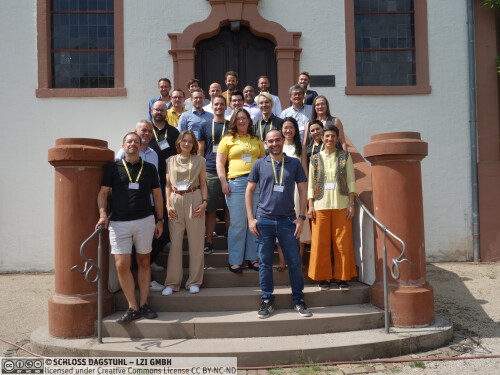
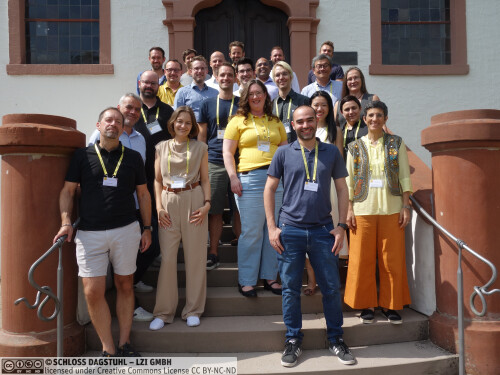
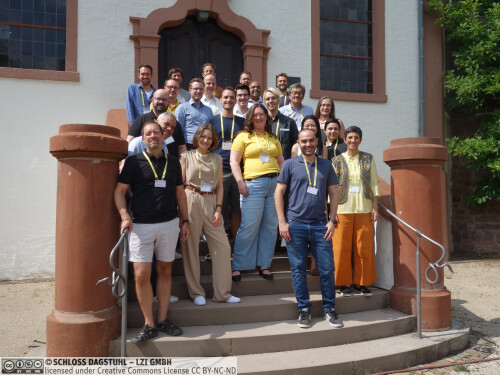
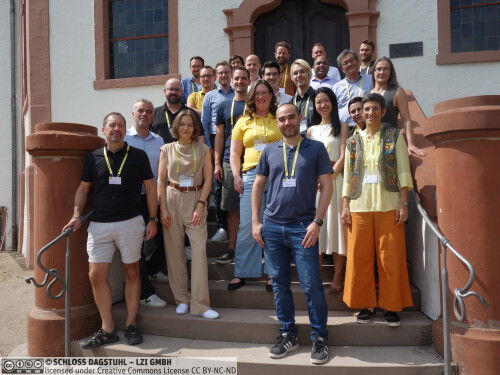
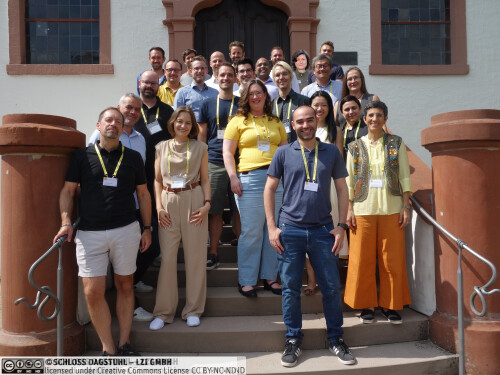
 Creative Commons BY 4.0
Creative Commons BY 4.0
